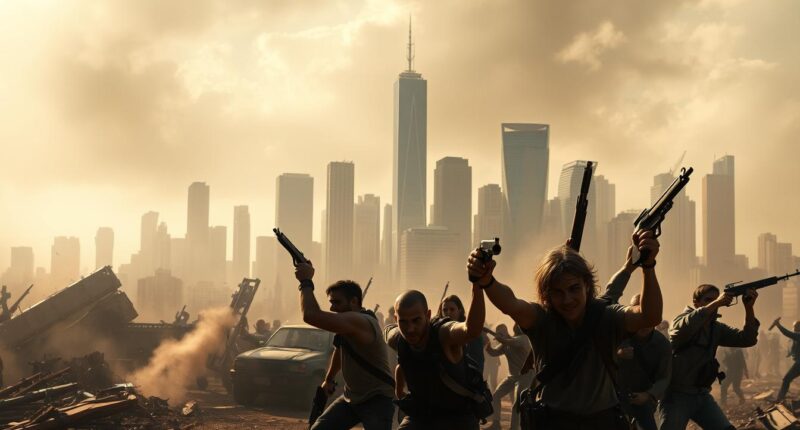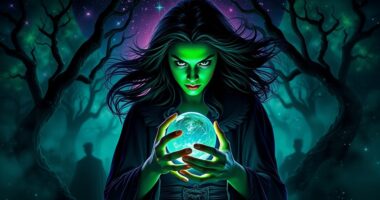If you’ve ever found yourself gripped by the tense moments in a zombie apocalypse film, you’re not alone. Many share that spine-chilling thrill that movies like World War Z evoke, where every decision could mean life or death. The adrenaline rush as the protagonist navigates through the chaos is matched only by the emotional weight that hangs over each scene. Enter a world where you must outwit the relentless undead, all while grappling with your own sense of humanity. It’s a dance with fear, and watching these tales of survival can evoke reflections on real-life challenges—reminding us of resilience against overwhelming odds.
Since its release in 2013, World War Z grossed over $540 million globally, captivating audiences with its depiction of a worldwide zombie outbreak. Yet, for fans craving more of this exhilarating action-horror genre, there’s a treasure trove of films that echo its intensity and heart. From the groundbreaking classics to international gems, this article will journey through must-see films that resonate with the same pulse-pounding spirit of World War Z.
Key Takeaways
- World War Z achieved immense success, grossing $540.5 million worldwide.
- Many action-horror movies share thematic elements with World War Z, enhancing viewer engagement.
- Zombies serve as a metaphor for survival, evoking both fear and introspection.
- Zombie films have evolved significantly since the introduction of the genre in 1968.
- Cinematic choices, character arcs, and narrative depth enrich the zombie film experience.
Why You’ll Love Zombie Movies
Zombie movies capture your imagination through a mix of action-packed sequences and profound storytelling. The thrilling zombie flicks of recent years have evolved significantly, integrating elements of survival horror that evoke deep emotions. You find yourself invested in the characters as they navigate life-and-death scenarios, offering both nail-biting excitement and relatable human experiences.
The Excitement of Survival Horror
Survival horror creates a sense of urgency and fear. Films like “28 Days Later” and “Train to Busan” take you on edge-of-your-seat journeys, featuring characters who must make split-second decisions to survive. The adrenaline rush is amplified when you witness their struggles against relentless undead foes, forcing you to reflect on your own instincts and resilience in dire situations.
Emotional Depth in Zombie Narratives
The zombie genre goes beyond mere terror, exploring emotional depth in horror. Many narratives center around loss, resilience, and the fight to maintain humanity amidst chaos. For instance, “Train to Busan” delves into the father-daughter dynamic amidst the apocalypse, making you feel every heart-wrenching moment. This emotional connection enhances the viewing experience, turning thrilling zombie flicks into poignant stories of hope and survival.

Must-See Films Similar to World War Z
If you are a fan of intense zombie narratives and post-apocalyptic thrillers, there are several films that capture similar themes and styles to World War Z. Here’s a look at some must-see films that deliver captivating stories and thrilling experiences.
28 Days Later: A New Kind of Zombie
This film, directed by Danny Boyle, reinvented the zombie genre with its raw depiction of societal collapse. It showcases the aftermath of a virus outbreak, forcing survivors to navigate a world in chaos. Its gripping atmosphere and character-driven story elevate it as one of the best examples in the category of intense zombie narratives.
I Am Legend: Solitude and Survival
Starring Will Smith, I Am Legend explores isolation against a backdrop of a post-apocalyptic New York City. As the last human survivor, Smith’s character faces both external threats and internal demons, creating a profound narrative about humanity’s struggle in a world devastated by a virus. This film exemplifies themes commonly found in post-apocalyptic thrillers, while pushing the boundaries of the zombie genre.
Train to Busan: An Intense Journey
This South Korean film has garnered international acclaim for its unique storytelling and relentless pacing. Train to Busan blends action with deep emotional moments, making it more than just another zombie film. Audiences find themselves engrossed in the characters’ struggles as they fight against the undead on a speeding train, capturing the essence of survival in a zombie apocalypse.
| Film Title | Release Year | Average Rating | Rotten Tomato Rating | Approval Rating |
|---|---|---|---|---|
| 28 Days Later | 2002 | 7.6/10 | 87% | 94% |
| I Am Legend | 2007 | 6.7/10 | 69% | 73% |
| Train to Busan | 2016 | 6.5/10 | N/A | 94% |

The Evolution of Zombie Movies
The zombie genre has seen a remarkable transformation since its inception in the 1960s. Originally characterized by simple storylines and straightforward horror, the evolution of zombie cinema has allowed for an exploration of deeper themes and societal issues. Filmmakers have embraced modern zombie tropes, integrating varied narrative styles and emotional complexities that resonate with audiences today.
Classic vs. Modern Zombies
Classic zombie films focused primarily on terror and survival. Movies like *Night of the Living Dead* set the groundwork for future creations. In contrast, contemporary films frequently offer social commentary, adding layers to the horror experience. For instance, films such as *Train to Busan* illustrate human resilience against adversity while showcasing emotional depth. This shift reflects the cultural significance of zombie films, as they mirror societal fears and contemporary challenges.
Cultural Impact of Zombie Films
The cultural significance of zombie films extends beyond mere entertainment. They serve as a lens through which you can examine societal anxieties, including pandemics and loss of control. The genre has influenced various media formats, from television series like *The Walking Dead* to video games such as *Resident Evil*. As global cinema continues to embrace this genre, the evolution of zombie cinema only solidifies its place in popular culture.

High-Octane Action: Resident Evil Series
The Resident Evil franchise stands as a cornerstone in action-horror movies, captivating audiences since its inception. The first film, released in 2002, set the stage for a series that has grossed over $1.2 billion globally across six films. With thrilling action sequences and a gripping storyline, it became one of the most influential video game adaptations in cinema history.
The Origins of Resident Evil
Inspired by the highly popular video game series, the Resident Evil films follow Alice, a bioengineered protagonist played by Milla Jovovich, as she battles the undead and various bioweapons. The blend of horror elements with intense action creates a unique viewing experience that resonates with fans of the genre. The franchise not only displays stunning visual effects but also explores deeper themes of survival and humanity amidst chaos.
Iconic Scenes You Won’t Forget
The action sequences within the Resident Evil franchise are nothing short of exhilarating. From explosive confrontations against hordes of zombies to captivating fight choreography, each film presents unforgettable moments. Notable scenes include the laser corridor trap in the first film and the high-octane car chase in Resident Evil: Afterlife. These sequences have solidified the franchise’s reputation for delivering *edge-of-your-seat* entertainment, making it a must-watch for admirers of action-horror movies.

A Fresh Take: Zombieland
“Zombieland” exemplifies the zombie comedy films genre by ingeniously merging humor and horror. This film’s representation of a post-apocalyptic world takes an unexpected route, blending laugh-out-loud moments with thrilling zombie encounters. Unlike traditional horror movies, this film brings a refreshing twist showcasing the absurdities of survival amid chaos.
Balancing Comedy and Horror
The film thrives on its unique takes on horror, transforming tense situations into comedic gold. Characters find themselves in outrageous scenarios, leading to dialogues that resonate well beyond the genre’s typical limits. This balance sets a remarkable tone, inviting you to laugh even when surrounded by a zombie apocalypse. As is often seen in the best characters in horror movies, the protagonists must navigate their fears while fostering camaraderie and humor, making “Zombieland” a delightful blend.
Memorable Characters You’ll Love
One of the standout features in “Zombieland” is its unforgettable characters. Jesse Eisenberg and Woody Harrelson portray dynamism that captivates viewers, further enhanced by their contrasting personalities. Each character, molded with distinct quirks and personalities, contributes to the charm and fun of the narrative. The film perfectly showcases how humor can create connections amongst diverse groups, even when facing terrifying odds. You’ll find yourself reminiscing about these characters long after watching, a hallmark of excellent storytelling in horror film culture.

Global Zombie Cinema
International zombie films represent a captivating segment of global cinema, showcasing diverse narratives and cultural interpretations of zombies. Various films from around the world delve into themes of survival, societal collapse, and human resilience in the face of a zombie apocalypse. Exploring this genre reveals how different cultures express fear and hope through their storytelling, making it a rich field of study for both film buffs and cultural enthusiasts.
The Best International Zombie Films
- Train to Busan (South Korea) – A sleeper hit that has garnered critical acclaim and a massive following, known for its emotional depth and intense action.
- REC (Spain) – A found-footage horror that revolutionized the genre, allowing for a raw and immersive viewing experience.
- Versus (Japan) – Blending action and horror, this film has gained a cult following for its unique take on the undead.
- Zombie Apocalypse (United States) – While having a lower reception, it still offers a glimpse into the mainstream’s approach to zombie narratives.
- I Am Legend (United States) – Often cited as a foundational work, drawing parallels between zombies and the human condition.
How Different Cultures Portray Zombies
Cultural interpretations of zombies vary significantly across the global landscape. In South Korea, zombies symbolize existential threats, as seen in Train to Busan, which highlights family bonds and survival instincts. Meanwhile, Spanish films like REC often explore the horror of confinement and societal breakdown. Japanese cinema tends to blend genres, merging action with horror and offering unique narratives, as seen in Versus. These different portrayals reflect broader themes in global cinema, inviting audiences to ponder what zombies represent within their cultural contexts.

Chilling Atmospheric Films
When delving into the world of atmospheric zombie films, two titles stand out due to their unique narratives and emotional storytelling. These films not only embrace the horror elements expected of zombie movies but also immerse the viewer in deep, resonant themes that linger long after the credits roll. The blend of compelling plots and atmospheric tension makes these films noteworthy contributions to the genre.
The Cured: A Unique Perspective
“The Cured” revitalizes the zombie narrative by focusing on the aftermath of a zombie outbreak. Rather than depicting relentless horror, the film explores the complexities faced by individuals who have been cured of the zombie virus. Issues of societal reintegration, guilt, and redemption provide depth, making it a standout among unique zombie narratives. The emotional storytelling allows viewers to engage with characters on a profound level, highlighting the struggles of their new reality.
Cargo: A Heartfelt Zombie Story
“Cargo” presents a gripping tale centered on a father’s relentless quest to protect his infant daughter in a post-apocalyptic landscape. This atmospheric zombie film elevates the genre through its focus on familial love and sacrifice, setting it apart from traditional narratives filled with jump scares. The film intertwines emotional storytelling with the chaos of a zombie-infested world, creating an unsettling yet profound viewing experience that resonates with audiences seeking more than just thrills.

| Film Title | Release Year | IMDb Rating | Runtime (minutes) |
|---|---|---|---|
| The Cured | 2017 | 6.6/10 | 95 |
| Cargo | 2017 | 6.7/10 | 105 |
Exploring atmospheric zombie films like “The Cured” and “Cargo” reveals how emotional storytelling can elevate a genre often steeped in horror and violence. With unique zombie narratives that focus on depth and character, these films invite you to reconsider the terrifying world of the undead through a more empathetic lens.
Essential Zombie Film Tropes
In the realm of zombie cinema, certain tropes consistently emerge, shaping the narratives and enhancing the viewing experience. These zombie film tropes not only highlight societal fears but also illuminate fundamental human traits. The undead serve as a metaphor for various themes in horror movies, often reflecting existential threats and societal collapse. With each new film, you witness characters grappling with a loss of normalcy while searching for purpose amid chaos.
The Role of the Undead
Zombie films often depict the undead as more than just mindless creatures. They symbolize humanity’s darkest fears, from disease spread to societal breakdown. Characters must confront their grim realities while battling the relentless threat of the undead. This portrayal invokes strong emotional responses, drawing audiences into a fraught narrative landscape, where the line between humanity and monstrosity blurs. As audiences witness these transformations, the horror of physical and moral decay becomes palpable.
Common Survival Strategies
Survival strategies in apocalyptic films frequently showcase resourcefulness and the importance of community. Protagonists rely on alliances and cooperation to navigate the treacherous world around them. Strategies such as fortifying safe spaces, utilizing available resources, and developing quick-thinking responses to crisis situations are common. Audiences become invested in these survival tactics, recognizing that they reflect broader themes of resilience, adaptation, and the enduring fight to maintain one’s humanity in the face of overwhelming odds.

Female-Led Zombie Films
Female-led zombie films have emerged as a powerful subgenre, offering unique perspectives and empowering narratives. With the rise of strong female characters, these films challenge traditional storytelling, making representation in zombie films more significant. Notable entries in this category blend elements of horror and drama while emphasizing themes such as survival, resilience, and compassion.
The Quiet Place: Survival Against All Odds
“A Quiet Place” captivates audiences with its nerve-wracking tension and focus on family dynamics. Directed by John Krasinski, the film features Emily Blunt as a mother navigating a world overrun by sound-sensitive creatures. This female-led story exemplifies survival against all odds, reinforcing the idea of empowerment in dire situations. The film’s innovative approach demonstrates how female-led horror films can push boundaries while appealing to broader audiences.
Little Monsters: A New Angle on Horror
“Little Monsters,” starring Lupita Nyong’o, redefines the zombie comedy genre by presenting a strong female protagonist who fosters empathy even in chaotic circumstances. The film cleverly intertwines humor and horror, reflecting a more compassionate approach to confronting existential threats. With its fresh take, “Little Monsters” enhances representation in zombie films while showcasing the importance of helping others in the face of danger.
| Film Title | Release Year | Lead Actress | Key Theme |
|---|---|---|---|
| A Quiet Place | 2018 | Emily Blunt | Family Survival |
| Little Monsters | 2019 | Lupita Nyong’o | Compassion in Chaos |

The Science Behind the Zombies
The portrayal of zombies taps into deep-seated fears about death, disease, and the collapse of social order. Understanding the science of zombie lore reveals how these horrifying figures reflect real anxieties and societal breakdowns. The evolution of zombie narratives showcases a blend of mythology and biology, making them compelling subjects for psychological thriller elements.
What Makes Zombies So Terrifying?
At the core of the terror surrounding zombies lies the rapid and uncontrollable spread of infection. The infection can initially stem from just one person, leading to exponential growth in cases. For instance, by the end of just two weeks, the hypothetical infection scenario indicates a staggering number of cases, exponentially increasing day by day:
| Day | Estimated Cases |
|---|---|
| 1 | 1 |
| 2 | 21 |
| 3 | 441 |
| 4 | 9,261 |
| 5 | 194,481 |
| 6 | 4,084,101 |
| 7 | 85,766,121 |
| 8 | 1,801,088,541 |
| 9 | 37,822,859,361 |
| 10 | 794,280,046,581 |
| 11 | 16,679,880,978,201 |
| 12 | 350,277,500,542,221 |
| 13 | 7,355,827,511,386,640 |
| 14 | 154,472,377,739,119,000 |
| 15 | 3,243,919,932,521,510,000 |
This abrupt increase brings a sense of urgency and terror, effectively portraying the panic associated with real-life pandemics. The psychological thriller elements enhance the feeling of helplessness against a relentless foe, making zombies a powerful metaphor for societal collapse.
Real-Life Inspirations for Zombie Lore
Real-life zombie inspirations are rooted in the parasitic behaviors found in nature. For example, certain parasites can alter the behavior of their hosts, creating a parallel with the infection depicted in zombie lore. This creates a chilling yet fascinating convolution of science and fear. Zombie narratives often mirror societal anxieties, transitioning from themes of slave rebellion and communism to modern issues like xenophobia and viral outbreaks.
Cinematic portrayals like George Romero’s *Night of the Living Dead* and *28 Days Later* illustrate how these themes have evolved, reflecting fears about societal stability and survival. The sensational aspects of infection, danger, and breakdown evoke visceral reactions, further enhancing the appeal of zombie narratives.

Documentaries About Zombie Culture
Zombie culture documentaries provide a fascinating dive into the evolution and significance of zombie narratives in society. These films often combine expert insights and cultural analysis, presenting you with a deeper understanding of this unique genre. By exploring various aspects, from eyewitness accounts to behind-the-scenes stories, these documentaries enrich your appreciation for the making of zombie films.
Exploring the Zombie Phenomenon
Documentaries such as The Undead Files (2022) examine eyewitness reports and expert testimonies on alleged zombie sightings worldwide, indicating a profound cultural fascination. The familiar themes within many films are mirrored in documentaries like Paranormal Pandemonium, which explores various accounts of zombie encounters, blending cultural beliefs with scientific viewpoints. This multidisciplinary approach sheds light on how our fears and interests have shaped the genre.
Behind the Scenes of Film Productions
Films often reveal compelling insights into the genre. In Rebirth of the Dead (2018), specialists from virology and anthropology provide perspectives on the plausibility of a zombie pandemic. Documentaries like Biohazard Chronicles (2023) engage with ethical questions surrounding scientific experimentation and its societal consequences. Additionally, the representation of government cover-ups as depicted in several documentaries highlights ongoing concerns regarding the public’s trust in authorities, intertwined with the narrative of the zombie apocalypse.

Fan-Favorite Zombie TV Shows
Zombie TV shows have captivated audiences by blending horror and drama, often creating a compelling narrative tapestry. The evolution of storytelling in television has allowed popular zombie series to explore deeper themes and character development. Here, we delve into some of the standout shows in the genre.
The Walking Dead: A TV Milestone
AMC’s The Walking Dead remains a cornerstone of zombie television, establishing a unique blend of character-driven narratives and intense action sequences. It spawned multiple spinoffs, such as The Walking Dead: Daryl Dixon and The Walking Dead: Dead City, further expanding its universe. The narrative follows survivors navigating a post-apocalyptic landscape, showcasing rich storytelling that has garnered a dedicated fan base.
Black Summer: Gritty Storytelling
Black Summer offers a raw perspective on survival amidst a chaotic zombie outbreak. Known for its realism and increased tension, this series stands apart from many popular zombie series by focusing on the human experience during a crisis. The storytelling immerses viewers in the relentless struggle for survival, highlighting both the physical and emotional impacts on the characters.

| Show Title | Network | Notable Features | Fan Following |
|---|---|---|---|
| The Walking Dead | AMC | Spinoffs, rich character arcs | Large, dedicated fan base |
| Black Summer | Netflix | Realistic approach, high tension | Growing popularity among viewers |
| All of Us Are Dead | Netflix | Teen demographic, school setting | Reached No. 1 on Netflix |
| The Last of Us | HBO | Post-apocalyptic journey | Critical acclaim, significant viewership |
| iZombie | The CW | Comedic elements, human-zombie coexistence | Niche fan base |
These shows exemplify the diverse storytelling in television, proving that the zombie genre is not just about horror but also human resilience, relationships, and the complexities of survival. As new series continue to emerge, the fascination with zombies remains strong, drawing viewers in with each twist and turn.
Upcoming Zombie Movies to Watch
The excitement surrounding upcoming zombie films continues to grow as filmmakers develop unique stories that challenge previous conventions. With fresh narratives on the horizon, these future releases in horror aim to captivate audiences while reflecting the evolving trends in zombie cinema. One of the most anticipated films, 28 Years Later, is set to release in June 2025, promising to explore themes of survival and transformation in a world still haunted by the undead.
Anticipated Releases in the Genre
- 28 Years Later – Release Date: June 2025
What to Expect from Future Films
As the genre evolves, upcoming zombie films will likely introduce innovative twists while maintaining familiar elements that fans adore. Expect compelling characters facing moral dilemmas, intense survival scenarios, and perhaps a blend of comedy and horror. These films strive to keep you engaged and reflect contemporary societal challenges, making the upcoming releases in horror a must-watch for enthusiasts.

Join the Zombie Community
Connecting with fellow fans of zombie films can heighten your experience and appreciation of the genre. Numerous platforms provide spaces for enthusiasts to engage in thrilling discussions and share insights about their favorite movies. You can find forums dedicated to all aspects of zombie culture, allowing for deep dives into character arcs, plot twists, and even the best survival strategies. Joining these zombie communities enriches your understanding and enjoyment of this captivating genre.
Where to Find Forums and Discussions
There are many online avenues where you can connect with others who share your passion for zombie films. Platforms like Reddit host channels focused on horror and zombie movies, making it easy to contribute to vibrant discussions. Facebook groups also offer a place for fans to unite, swap recommendations, and share horror favorites. Engaging in these film forums can uncover hidden gems and foster connections with fellow horror enthusiasts.
Sharing Your Favorite Zombie Films
Actively participating in discussions allows you to share your favorite zombie films. By exchanging opinions and preferences, you contribute to a collective understanding of what makes these movies memorable. Whether you favor high-action titles like “Resident Evil” or brain-tickling comedies such as “Shaun of the Dead,” sharing these insights adds to the enjoyable tapestry of zombie culture. You will also discover others who appreciate the same films, creating bonds that enhance the zombie viewing experience.

Conclusion: Dive into the Zombie Apocalypse
If you’re ready to immerse yourself in thrilling narratives and intense action, exploring zombie films is a must. Not only do these films deliver adrenaline-pumping excitement, but they also provide thought-provoking reflections on humanity’s fears and societal challenges. The genre has evolved significantly, showcasing everything from large-scale spectacles like “World War Z” to intimate stories in films like “28 Days Later.” This diversity presents countless reasons to watch horror, allowing you to experience varied perspectives on life’s most frightening scenarios.
Why You Need to Watch These Films
Engaging in the genre of zombie cinema brings you closer to understanding complex themes that resonate with audiences worldwide. Each film, whether action-packed or deeply emotional, offers a unique window into the human condition during apocalyptic scenarios. With standout performances, innovative storytelling, and horror elements that cater to both casual viewers and hardcore fans, you’re bound to find films that captivate your imagination. “World War Z,” for example, takes a distinct narrative approach that mixes horror with medical mystery, setting it apart from conventional offerings.
Final Thoughts on the Genre
As you dive into these must-see films, you’ll discover that the zombie genre is more than just blood and gore; it’s an arena where creativity thrives. With every new release, filmmakers continue to push boundaries and develop fresh takes on classic tropes. So, whether you prefer the fast-paced action of infected hordes or the psychological tension of survival, there’s a zombie film that will resonate with you, leaving you eager for more. Embrace the thrill and let your cinematic journey through the undead begin!









